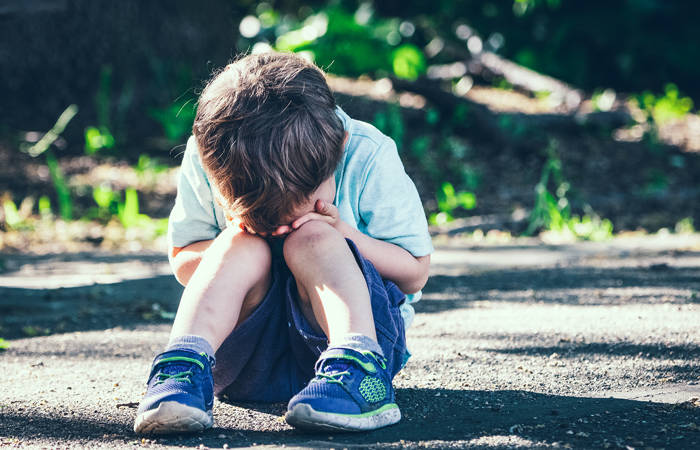Like what you see?
Sign up to receive more free parenting advice.
Thank you for subscribing to our newsletter!
Child Development

Credit: iStock.com/StefaNikolic
Speaker, author and academic Dr Michael Nagel looks at the impact of bullying and how parents can recognise the signs and help children build the skills to combat unwanted attention and bullying.
How do you know if your child is being bullied? Equally important, how do you know if your child is bullying others? When does teasing or playful aggression turn into torment?
Bullying, whether receiving or instigating, is not a trivial matter. Bullying has been linked to long term emotional and social problems and can impact all manner of relationships.
Human beings are social creatures by nature and bullying can impair the very relationships that children need for all aspects of healthy development. Relatedly, we know that negative social experiences and dealing with such interactions provide opportunities for important skills to learn.
Far better to deal with difficult relationships first-hand as a child when possible than have a parent hover overhead looking to interject or find a safe space. So, how do we help children deal with troubling relationships and, what should be done when a child may be the bully and not the victim?
One of the first things to remember is that when a child complains about being bullied, you want to be sure that that is actually the case. It is not uncommon for children or parents to mislabel undesirable behaviour as bullying. Teasing is not bullying and the odd altercation is not necessarily a sign of something more nefarious.
Bullying is, at its core, a power play and even young children can bully. A bully repeatedly uses a position of power to harm another. That harm can come in many forms. And while it can be difficult to know a young bully’s intent, the behaviour of a bully always manifests as repeatedly looking to hurt another. One off situations should not be considered bullying but likely immature social skills. However, repeatedly attacking someone physically or verbally, making threats, lashing out, not sharing toys or play spaces, spreading rumours, excluding someone from a group can all be forms of bullying.
What to do if your child is being bullied
It is important to remember however, that the key indicators for bullying are repetition and an intent to harm. So, what to do if your child says they are being bullied?
First, any claims of being bullied need to be taken seriously. This needs to be done in an empathetic way without implying your child is ‘fragile’ or displaying frustration or anger.
While you might have a deep and burning desire to solve the problem by approaching teachers or confronting the bully’s parents it is far better to temper that response.
Instead, exude confidence and show that you and your child can work together to solve the problem.
Second, it is important to have a clear understanding of what is happening. Get all the facts you can before discussing what to do. You need to know, as best as possible, who is involved, when and where bullying occurs and how your child reacts in those situations.
Once you feel you have a sense of what is happening there are a few strategies you can offer.
One of the first things you can suggest to your child is to ignore the bullying behaviour and walk away. Bullies are often looking for attention so ignoring them is a good first step.
If that does not work then teach your child to be assertive and stand up for themselves. This can be done by role playing and having your child learn to say ‘leave me alone’ in a confident and calm manner. And while teaching your child to stand tall and telling the bully to stop is a good first step it might also be necessary for your child to find friends who have encountered similar situations for advice or enlist them as allies.
It is also important to convey to them to get help from a ‘grown-up’ if needed. Finally, it may be prudent for you to get other adults involved, but before looking for outside adult assistance such as a teacher or coach, you should also seek your child’s permission for doing so.
Immediately taking matters to another level through approaching another adult risks embarrassment over any notion of agency. If you are going to teach your child to be assertive and confident and/or ask for help then they need to practice doing so before any parental intervention. .
Now as you are reading this you might think that that all sounds good but what if it doesn’t work? It is hard to have a blueprint for all scenarios given that bullying can take many forms and occur in many contexts, so the best you can do is monitor the situation and ensure your child tells you if things don’t improve. And as noted above, if your child is struggling you may need to intervene in some way as prolonged bullying is simply unhealthy for anyone let alone a child.
Bullying is, at its core, a power play and even young children can bully. A bully repeatedly uses a position of power to harm another. That harm can come in many forms. And while it can be difficult to know a young bully’s intent, the behaviour of a bully always manifests as repeatedly looking to hurt another.Dr Michael Nagel
Stay up to date with the latest news and articles from First Five Years
Thank you for subscribing to our newsletter!
Discovering your child is the bully
This is also true if your child is doing the bullying.
Arguably, most parents never want to find out that their child is a bully. I say ‘most’ as bullying can sometimes be a learned behaviour via observing parents. But for the vast majority of parents, it can be quite painful to hear that their child is intentionally hurting someone.
It is also significant to know that bullying behaviour can be a sign of underlying mental health or social issues.
Most young children who engage in bullying behaviours are not necessarily ‘bad’. Bullying behaviours might be a sign of distress, anxiety or depression.
Remember that young children are not as good at regulating their emotions due to a relatively immature brain. Moreover, the forming of social bonds and friendship groups is something that children are still figuring out and where mistakes can be made.
When a child wants to be part of a group of friends or may actually be the victim of bullying, they may engage in bullying behaviours to fit in or find their own sense of power by being aggressive to others.
Bullying can also be a form of attention seeking or the result of being too assertive while not being able to fully grasp how their behaviour is making their victim feel.
Not unlike emotional regulation, ‘theory of mind’ and the ability to sense or feel how someone else might be feeling improves with age. Theory of mind does not appear to be present at birth but unfolds progressively over time and as such young children are not always in ‘tune’ with the feelings of their siblings or peers. This is why communicating with that child is so important.
If your child is bullying someone, you must talk about it. Try to find out, from their point of view, what’s going on and talk about what friendships look and feel like.
Don’t ask your child how they think another might feel when bullied and instead ask them how they would feel if someone did something similar to them.; it is far easier for an immature mind to think of their feelings as opposed to those of others.
Through heartfelt discussions you may uncover the underlying reasons why your child is bullying and tailor your responses to the challenges associated with the behaviour. For example, some children might bully and exert power to get noticed due to low self-esteem. Being seen as a bad child is better than not being seen at all and so opportunities for attention might be a remedy to bullying behaviour.
Finding the roots of the problem is the first step and once uncovered will require your help in resolving them in order to arrest the undesired behaviour.
In these situations it is best to frame what you want to see as proactive behaviours for forming positive relationships rather than focusing on the bullying.
Telling your child that you would like them to treat others kindly and include them or role play such interactions is likely to get better results than saying that you don’t want them to be a bully. Children generally respond better to being told what to do rather than what not to do.
And finally, as painful as it might be, it is important for parents to look inward and reflect on their own behaviours.
A positive home environment where people treat each other with kindness and respect and where yelling, name-calling or putdowns are uncommon is a place where healthy emotional and social development occurs.
A healthy and happy home environment is perhaps the best antidote to any form of bullying.

Dr Michael Nagel
Associate Professor, School of Education, University of the Sunshine Coast
See more





